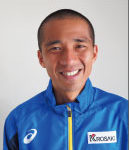Hayato Sonoda
age: 30sponsor: Kurosaki Harima
graduated from: Kumamoto Kokufu H.S., Jobu University
best time inside MGC window:
2:09:34, 2nd, 2018 Beppu-Oita Marathon
PB: 2:09:34, 2nd, 2018 Beppu-Oita Marathon
other PBs:
5000 m: 14:05.64 (2016) 10000 m: 28:52.49 (2018) half marathon: 1:03:00 (2016)
marathons inside MGC window (Aug. 1 2017 – April 30 2019)
18th, 2019 Boston Marathon, 2:15:58
8th, 2019 Beppu-Oita Marathon, 2:10:39
5th, 2018 Fukuoka International Marathon, 2:10:31
4th, 2018 Jakarta Asian Games Marathon, 2:19:04
2nd, 2018 Beppu-Oita Marathon, 2:09:34 – PB
11th, 2017 Fukuoka International Marathon, 2:12:04
other major results:
33rd, 2019 Gifu Seiryu Half Marathon, 1:05:42
21st, 2019 Niigata Half Marathon, 1:06:01
27th, 2019 New Year Ekiden Fourth Stage (22.4 km), 1:07:34
5th, 2018 Kyushu Corporate Ekiden Seventh Stage (16.3 km), 47:22
70th, 2018 Valencia World Half Marathon Championships, 1:04:12
7th, 2017 Lake Biwa Marathon, 2:11:32
4th, 2016 Fukuoka International Marathon, 2:10:40
37th, 2016 Lake Biwa Marathon, 2:19:25
1st, 2016 Austin Marathon, 2:23:30
38th, 2016 Marugame Half Marathon, 1:03:00 – PB
13th, 2015 Fukuoka International Marathon, 2:17:40
38th, 2015 Lake Biwa Marathon, 2:22:13
1st, 2015 Kumamoto-jo Marathon, 2:18:00
With a head tilt that brings to mind Hiromi Taniguchi and Abel Kirui and an uncanny resemblance to the portrayal of Japanese legend and fellow Kumamoto native Shizo Kanakuri on NHK’s Idaten series (maybe the other way around?) Sonoda has been the likeable underdog weirdo on the MGC scene over the last two years. Sonoda graduated from Jobu University, whose ultimate Hakone Ekiden underdog team backstory, a group of students who wanted to run Hakone and called up a retired former great to coach them to it, made up the basic plot of the Kaze ga Tsuyoku Fuiteiru movie.
Kanaguri helped found Hakone with the aim of developing the next generation’s Olympic marathoners, and Sonoda represents the peak of those college dreams, the guy who went from wins at amateur races around the 2:20 level to a 2:10:40 breakthrough for 4th at the 2016 Fukuoka International Marathon that he seemed to pull off on sheer determination.
Since then he’s been pretty consistently around 2:10, making another breakthrough with a 2:09:36 for 2nd in Beppu-Oita last year and taking 4th in extreme heat in the Jakarta Asian Games marathon a few months later. Pretty the only weak link in the chain has been his last marathon, a 2:15:58 for 18th at this year’s Boston Marathon. With six marathons in the 21-month MGC Race qualifying window he’s run more than anyone else on the entry list. Will he be one of the last left standing in the MGC Race? Doubtful. Will he go with the front pack no matter what? Bet on it.
next profile: Yuji Iwata (MHPS).
© 2019 Brett Larner, all rights reserved


Comments